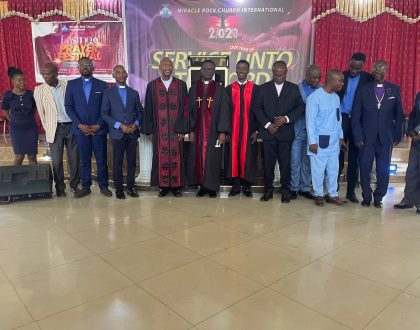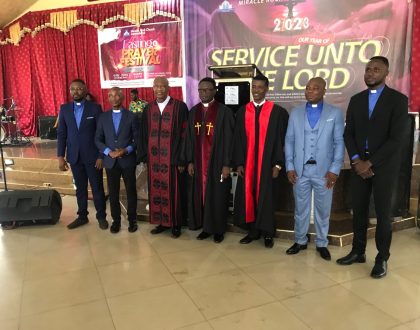The Word of God: How Does It Work in My Life?

by Ed Arcton
God has spoken in the Scriptures of the Old and New Testaments (2 Tim. 3:16). This is part of the basic Christian confession. Another part is that the God who has spoken speaks to us every time we read the Word, hear it read, or hear it preached (1 Thess. 2:13). Do you have that conviction? Sadly, I’ve found that many Christians either do not know this or have so rejected extremes in the Charismatic and Pentecostal churches of their past that it’s as though God were silent to them.
Did God speak in times of old? Absolutely (Heb. 1:1–2). Does God still speak? We should be able to say the same: “Absolutely!” But how is this the case? The answer is the Holy Spirit. As one Reformed standard states, “The Spirit of God maketh the reading, but especially the preaching of the Word, an effectual means …” (Westminster Larger Catechism, Q&A 155). As the Apostle Paul described it, “The sword of the Spirit … is the word of God” (Eph. 6:17). It’s not the bare Word read, the act of preaching itself, or especially the preacher, but the Holy Spirit who takes the Word written and causes it to be the Word living to our souls. Psalm 19 rejoices in this when it says “The law” is “the law of the Lord,” “the testimony” is “the testimony of the Lord,” “the precepts” are “the precepts of the Lord,” “the commandment” is “the commandment of the Lord,” and “the rules” are “the rules of the Lord.”
Consider three points on how the Word works by the power of the Spirit when we read and hear it.
1. To Effect My Recognition of Sin
How does the Word work in my life? The Holy Spirit powerfully uses the Word to effect my recognition of sin. He causes the Word to enlighten, convince, and humble me.
In Psalm 19, we have the prayer of a believer, David, who meditates upon the effectiveness of the Word: “The commandment of the Lord is pure, enlightening the eyes” (v. 8). The Word of God enlightens, that is, opens our eyes to the reality of who we are, what is within us, and what we have done (Ps. 19:12–13). “But don’t we already know we are sinners and have already trusted in Jesus?” This is a common objection. But think of a farmer. Does a farmer only remove the rocks from his field, break up the ground, prepare the soil once, and then go on merely to plant and harvest every year? No. He must constantly do this. In the same way, we need the Holy Spirit to open our eyes constantly to our sins as we read and hear the Word.
This is also true for unbelievers. It is an assumption in the New Testament that unbelievers will be in the midst of God’s people in public worship. In 1 Corinthians 14, Paul contrasts what happens when unbelievers enter a church in which there are tongues—which I take as foreign languages—or in which there is prophecy—which I take as preaching:
If, therefore, the whole church comes together and all speak in tongues, and outsiders or unbelievers enter, will they not say that you are out of your minds? But if all prophesy, and an unbeliever or outsider enters, he is convicted by all, he is called to account by all, the secrets of his heart are disclosed, and so, falling on his face, he will worship God and declare that God is really among you. (1 Cor. 14:23–25)
2. To Effect My Reception of the Savior
How does the Word work in my life? The Holy Spirit powerfully uses the Word to effect my reception of the Savior. He causes the Word to drive me out of myself and to draw me to Jesus Christ, to paraphrase the Westminster Larger Catechism again (Q&A 155).
Psalm 19 says, “The law of the LORD is perfect, reviving the soul; the testimony of the LORD is sure, making wise the simple” (v. 7). The Word of God has a reviving effect because it causes life to come from death, not only once and for all to those dead in their sins (Eph. 2:1) but to the believer in times of deep struggle with sin (Rom. 7). The Word of God has a “wising up” effect because it causes those who are unwise in themselves to be wise in Christ. Paul reminded Timothy to “continue in what you have learned and have firmly believed” (2 Tim. 3:14). What was that? His being “acquainted with the sacred writings, which are able to make you wise for salvation through faith in Christ Jesus” (v. 15).
In the Word, the Holy Spirit does not just yell out, “Fire!” He also stands up in the midst of the danger and directs people to the safe exit. Think about Peter’s Pentecost sermon. Afterwards, we read, “Now when they heard this, they were cut to their heart, and said to Peter and the rest of the apostles, ‘Brothers, what shall we do?’” (Acts 2:37). Peter didn’t leave them in their guilt, but he pointed them to the grace of Jesus Christ. The Holy Spirit speaks to you in the Word of the danger of eternal hellfire, but he also speaks to you of the way of escape in Jesus.
3. To Effect My Realization of Sanctification
How does the Word work in my life? The Holy Spirit powerfully uses the Word to effect my realization of sanctification. When we read the Word and hear it preached to us, the Holy Spirit works to sanctify us.
First, the Spirit uses the Word to conform me to the image of Jesus (Rom. 8:29), subduing my will to bring it into alignment with Jesus’ will. Second, the Spirit uses the Word to strengthen me against all the temptations and corruptions so prevalent in the world and to fortify me against my own sinful nature (Eph. 3:16). Third, the Spirit uses the Word to build me up in grace, establishing my heart in holiness and comfort through faith.
These all-encompassing aspects and angles of our sanctification are expressed in Paul’s magisterial definition of the Word’s inspiration, saying not only, “All Scripture is breathed out by God,” but also that it is “profitable for teaching, for reproof, for correction, and for training in righteousness.” And the goal of the Word is “that the man of God may be complete, equipped for every good work” (2 Tim. 3:16–17).
This is why Christians need to read the Word personally daily and hear the Word read publicly weekly. When we do so, the Spirit speaks to us via the living and active Word of God (Heb. 4:12). In the words of the Puritan Thomas Watson, “The word is both a glass to show us the spots of our soul, and a laver to wash them away. The word has a transforming virtue in it; it irradiates the mind, and consecrates the heart.”
From Daniel Hyde
Recommended Posts

THE CHALLENGE AND URGENT NEED
May 29, 2023

The Workers Are Few.
May 29, 2023

Graduation and Ordination Service
May 28, 2023
